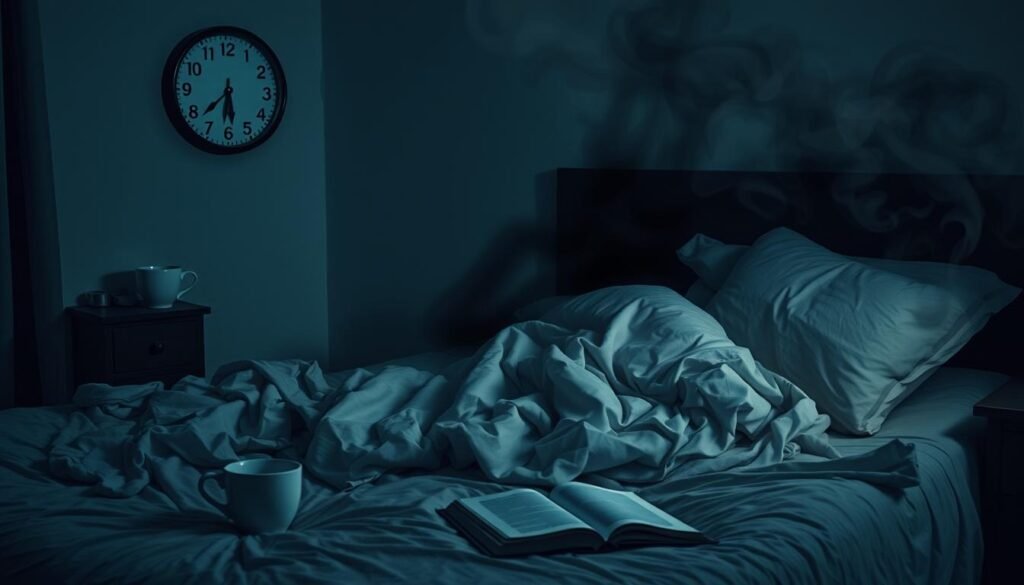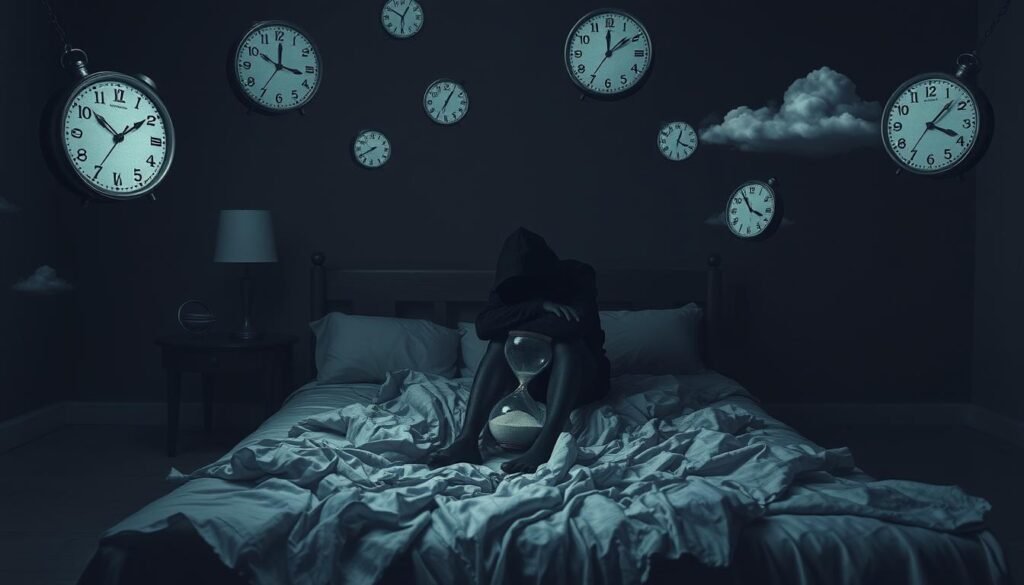Did you know that most insomnia cases are chronic? It accounts for 85 to 90 percent of them. This sleep disorder messes with sleep patterns. It harms our mental and physical health. As more people age, more suffer from insomnia. This leads to serious health issues. Studies show not sleeping enough raises death risk by 12 percent. If insomnia keeps up, this risk jumps to 97 percent. It’s vital to know how insomnia affects us. We must look for effective ways to manage it.
Our fast-paced lives can lead to chronic insomnia. Stress, jet lag, and bad sleep habits are common causes. Fixing sleep with a regular schedule or taking melatonin helps. Yet, some turn to sleep drugs like doxepin and zolpidem. These can have bad side effects. We need better sleep education now. Cognitive Behavioral Therapy (CBT) can also assist in dealing with insomnia. Understanding sleep’s role in our health is key. We must face insomnia’s serious effects on our daily lives.
Key Takeaways
- Chronic insomnia affects 85 to 90 percent of insomnia sufferers.
- Lack of sleep can increase the risk of death by 12 percent.
- Persistent insomnia raises mortality risk by 97 percent.
- Cognitive Behavioral Therapy (CBT) is effective in managing insomnia.
- Healthy sleep habits are crucial for overall mental and physical health.
- Older adults are more likely to experience insomnia than younger individuals.
- Small lifestyle adjustments can improve sleep quality for many individuals.
Understanding Insomnia
Insomnia makes falling or staying asleep hard. The insomnia definition covers different problems like restless sleep. It comes in forms like acute and chronic insomnia. Chronic insomnia lasts for three months or more. It can be caused by lifestyle, changes in environment, or health issues.
Between 8% and 40% of people suffer from insomnia. About 20% to 30% have poor sleep, and 8% to 10% face chronic insomnia. Around 4% use sleeping pills. These facts show the need for better understanding and treatments.
Chronic insomnia can lead to heart and brain health issues. Insomnia with enough sleep often means wrong perception of sleep quality. It’s important to understand these differences for choosing the right treatment. Both biological and psychological treatments can help.
Seeing a doctor for ongoing sleep problems is a good idea. Finding the cause is key to getting the right treatment. For more on sleep disorders, check out this insomnia resource.
Common Symptoms of Insomnia
Insomnia shows up in many ways, often causing a lot of difficulty sleeping. People may find it hard to fall or stay asleep, leading to restless sleep. They might wake up feeling like they didn’t rest at all. Knowing these insomnia symptoms is key to getting better.
Common signs include:
- Difficulty falling asleep or staying asleep
- Waking up too early and being unable to go back to sleep
- Feeling tired during the day
- Getting easily upset or having mood changes
- Having a hard time focusing
- Dealing with headaches and body pains
Insomnia can really impact daily life, making you feel wiped out. If you’re dealing with these issues, it might be time to get some advice. A healthcare provider can discuss ways to manage insomnia and boost your well-being. For further details, check out this link.

Impact of Insomnia on Mental and Physical Health
Insomnia affects both mental and physical health deeply. Poor sleep leads to emotional and cognitive challenges. Understanding this is key to knowing how it changes a person’s health.
Effects on Mood and Emotional Well-being
Chronic insomnia makes mood disorders more common. People with long-term sleep issues may face anxiety, depression, and emotional instability. Bad sleep harms emotional well-being. It makes managing stress harder. Those suffering may feel emotionally upset, hurting their relationships and daily life.
Research shows that people with insomnia are likely to get depressed five times more than those who sleep well. Look into the impact of insomnia for more about mental health effects.
Connection to Cognitive Impairment
Insomnia badly affects thinking, memory, and decision skills. It makes the brain slow in processing and lowers alertness. With insomnia, these problems get worse, making learning and focusing hard.
People with sleep problems may find thinking clearly hard. This might make them more likely to get into accidents. Not sleeping enough also messes up hormones, making thinking problems even worse.
| Effects of Insomnia | Mood Disorders | Cognitive Impairment |
|---|---|---|
| Increased Anxiety | Yes | Yes |
| Emotional Instability | Yes | No |
| Decreased Focus | No | Yes |
| Poor Memory | No | Yes |
| Risk of Depression | Yes | No |
| Impulsive Behavior | Yes | No |

The Effects of Sleep Deprivation
Not getting enough sleep can greatly affect how we live, especially with chronic fatigue. Often, people don’t see how crucial sleep is to their health. To heal and get energy back, our bodies need rest.
Chronic fatigue happens when we constantly miss sleep. This makes it hard for us to do physical and mental work.
Chronic Fatigue and Daily Functioning
Chronic fatigue is feeling tired all the time. This can lead to headaches and weak muscles. Simple tasks then become hard to do.
As everyday jobs get tougher, we feel too drained to get better. Those with chronic fatigue find their life’s joy slipping away. They stress how vital it is to tackle the effects of not sleeping enough.
Loss of Productivity
Skipping sleep affects not just health, but also work. Productivity drops are a major problem. This is true for any job.
Studies show that those who don’t sleep enough risk more mistakes and accidents. This isn’t just about being tired. It’s about how sleep loss messes with thinking and focusing. For more details on how sleep touches our health, click here.

| Effects of Sleep Deprivation | Impact on Individuals |
|---|---|
| Chronic Fatigue | Significant tiredness affecting daily tasks |
| Cognitive Impairment | Difficulty concentrating and memory issues |
| Productivity Loss | Decreased performance in work or academic settings |
| Increased Risk of Accidents | Higher likelihood of errors in judgment |
| Mood Changes | Increased irritability and anxiety |
Insomnia and Mood Disorders
Insomnia greatly affects mood disorders like anxiety and depression. Research shows a strong link between them. People with insomnia are ten times more likely to get depressed than those without sleep problems.
Around 75% of those with depression also struggle with sleep. This shows how closely sleep and emotional well-being are connected.
Anxiety and Depression
Insomnia and mood disorders affect each other in many ways. For example, insomnia reduces the deep sleep needed for emotional health. Those with depression are also more likely to have sleep apnea, which worsens mental health.
The ongoing battle with sleep problems can increase anxiety and depression risks. Combining cognitive-behavioral therapy for insomnia (CBT-I) with depression treatments can improve sleep and help overcome depression. For more info, click here.
Increased Stress Levels
Insomnia can make stress worse, leading to a cycle of sleep issues and high stress. About 34% of adults say their sleep quality is poor. This lack of sleep can weaken mental and emotional health.
The American Psychological Association sees chronic insomnia as a big reason for high stress. Tackling sleep problems is key to better emotional health. For those with mood disorders, managing insomnia through behavioral methods and medication is crucial.
Insomnia’s Impact on Physical Health
Insomnia does more than just mess up how we sleep. It’s a big danger to our health. It’s vital to know these risks, especially for those having trouble sleeping. Mainly, insomnia leads to serious health issues like:
Cardiovascular Risks Associated with Insomnia
Studies link insomnia with heart problems. Not sleeping enough can make blood pressure go up. It can also make your heart beat faster. Because of this, there’s a bigger chance of getting heart disease or having a heart attack. People with insomnia should take this seriously and seek help early.
Immune System Deficiency and Illness
Not getting enough sleep weakens our immune system. A strong immune system fights off germs and keeps us healthy.
People who don’t sleep well don’t make enough protective antibodies. This makes them more likely to get sick. Their risk is even higher during the cold and flu season.
Insomnia really challenges our health. If we deal with it right, through good sleep strategies or therapies, we can better protect our heart and strengthen our immune system.
Insomnia and Weight Gain
The link between not sleeping enough and gaining weight is growing more important. Studies show that lack of sleep can mess with your hormones. This affects how hungry you feel and your weight control.
How Sleep Affects Hunger Hormones
Poor sleep messes up the balance of leptin and ghrelin, hormones that control hunger. Leptin tells you when you’re full, and ghrelin makes you hungry. Not sleeping enough increases ghrelin and decreases leptin. This makes you want to eat more, especially unhealthy, high-calorie foods.
People who don’t sleep enough often choose foods rich in sugar and carbs. Stress can make things worse by raising cortisol levels. This makes you hungrier and may lead to eating junk food at night for comfort.
Kids not getting enough sleep also face a higher obesity risk. This is due to hormonal changes and bad eating habits from irregular sleep. Not sleeping well can make you too tired to exercise. This lack of activity and possible poor diet fuel weight gain.
Improving your sleep can help fix your hunger hormones. Good sleep hygiene can lead to a healthier lifestyle, better eating habits, and weight control. If you’re dealing with both sleep problems and weight issues, it’s smart to ask for help from healthcare experts.
Long-term Consequences of Untreated Insomnia
Untreated insomnia can harm your health over time. It’s strongly linked to a greater chance of getting diabetes. This is due to poor sleep messing with blood sugar control.
Long-term lack of sleep makes glucose tolerance worse. It also raises the risk of insulin resistance. This is a big problem for those not getting enough rest.
Diabetes Risks and Blood Sugar Regulation
About 70 million people in the U.S. have trouble sleeping. One in every three adults doesn’t get the recommended seven hours of sleep each night. This lack of sleep not only messes up daily life but also ups diabetes risks.
People over 45 who sleep less than six hours might face double the risk of strokes or heart attacks. This shows how vital good sleep is for keeping blood sugar levels in check.
Effects on Overall Life Quality
Untreated insomnia doesn’t just affect physical health; it hurts how you feel about life. People with sleep issues often face mood swings and become less social. They might also feel unclear mentally, which can increase anxiety and depression.
This makes daily life and hanging out with friends harder. It means less happiness in life.
Conclusion
Insomnia’s effect on our health is huge. Studies show 13% of people don’t get enough sleep. This leads to major mental distress. People sleeping 6 hours or less are more at risk. They’re 2.5 times more likely to feel stressed than those who sleep more.
Research connects poor sleep to mental health issues. About 14.1% feel stressed often. And 20 to 35% face insomnia symptoms. This is due to various stress factors. It’s key to find good ways to improve sleep and lower insomnia’s impact.
Getting better sleep improves health. It’s crucial to talk to doctors for advice on sleep. Aware of what causes insomnia, we can live better. This reduces the chance of getting sick long-term.